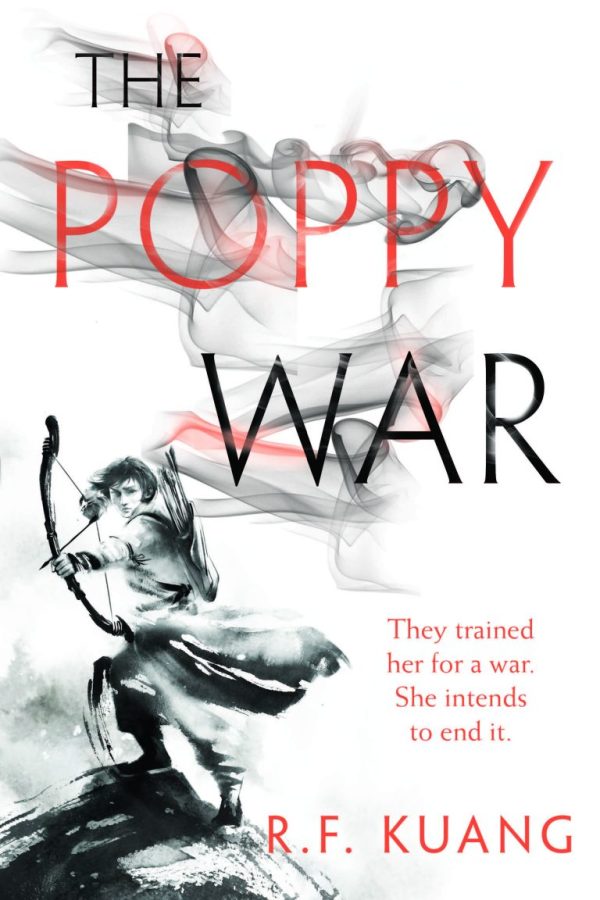“The Poppy War,” history told through fantasy
Disclaimer: “The Poppy War” is filled with graphic content that many will find disturbing. I recommend looking up content warnings before reading.
“What if Mao Zedong was a teenage girl?” is how R.F. Kuang once described her 2019 debut novel, an adult fantasy inspired by the Second Sino-Japanese War and the Song Dynasty. With it, Kuang explores power, war, colonialism, and belief. “The Poppy War’s” strong historical parallels and gripping magic make it one of the greatest books of our time.
Earning her way into the country’s top military academy is the only option for Fang Runin—or Rin for short, a war orphan about to be sold off into an arranged marriage by her opium-dealing foster parents. After years of extensive and torturous studying, Rin earns an abnormally high score on the Empire’s military academy entrance exam and is sent off to the prestigious Sinegard, where she is immediately treated lesser-than due to her dark skin, gender, and southern upbringing. At school, Sinegard’s skilled yet unprofessional Lore Master takes her under his wing, and it is in his class that Rin discovers she has a gift of shamanism. However, calling on her vengeful Phoenix god comes at a dangerous cost. To achieve full shamanic power—power that could give her country an advantage in the looming war—Rin will have to give in to the Phoenix entirely. What will she do to save her country?
I had high expectations diving into the rich fantasy world of “The Poppy War.” After being told by an abundance of my peers—who I share almost identical book taste with—that it would change my life, I assumed it would be one of my new favorites, but nothing anyone could have told me about it would have prepared me for what I was about to delve into. It is, by far, my favorite book I have read this year, and I cannot wait to finish the next two novels in the trilogy.
It shocks me that this is Kuang’s debut novel considering how masterfully it is written. The story and prose flow to create lush imagery, three-dimensional characters, and a painfully accurate depiction of war. It was hard to put down, mainly due to its pacing. Some chapters recount the events of one day while years pass in others, but Kuang pulls it off seamlessly because she knows when a time jump is necessary to move the story along. The chapters are the perfect length, and they always end with a sudden twist, so I would often lie to myself that I would only read one more chapter, but then I would end up reading a lot more. With its pages densely packed with action, I constantly lost track of time while reading it. This book took over my life, and I put everything on hold to finish it. When I was not reading “The Poppy War,” it was all I was thinking about.
Fang Runin is one of the most extraordinary protagonists I have ever encountered. The book is written in third person limited, so readers get an outside-perspective of Rin while also being able to hear her inner thoughts. Rin goes through a lot, and that makes her seem like less of a book character and more of an actual person. To escape her home life, she puts herself through hell and back to earn a spot at Sinegard. When she gets into Sinegard, she does all that she can to succeed, even if that means jeopardizing her physical and mental health. Becoming a soldier comes with its own endless traumas. We can sympathize with Rin, and we can root for her, but we can also admit that she is a flawed individual who does not always make the best decisions. It is her nuanced character that makes “The Poppy War” such an all-around impressive novel.
Drawing inspiration from religions and cultures rooted in China, Kuang created her own epic mythology. In the world of “The Poppy War,” shamans use psychoactive substances and meditation to escape the material world and commune with the gods. Rin has the ability to call on the Phoenix god, who fills her with fire (literally) and rage. Shamans, in this world, are exceedingly rare and extremely dangerous. The entire concept of drugs and shamanism as a gateway to the gods and their powers is so intriguing to me, and I loved seeing the roles these gods among men played in the war.
The idea for “The Poppy War” came to Kuang after talking with her grandparents about their experiences in 20th century China. Kuang, who was studying Chinese history at Georgetown University at the time, was angered by the fact that the West rarely talked about the tragedies her grandparents spoke of. “The Poppy War” was a way for her to process the information she had learned and to ensure that her family’s story was not forgotten. She writes in the Author’s Note, “It’s a history that isn’t often taught in American classrooms, and which often is not known even to members of the Chinese diaspora. I hope my work does a little bit to change that.”
In her book, each fictional nation has an obvious real-life counterpart. The international conflict between Nikan and The Federation of Mugen in the book are parallel to that of China and Japan during the 1930’s and 40’s, and most of the war atrocities that take place in the novel were directly inspired by the events of the Second Sino-Japanese War, such as the Nanjing Massacre, the Battle of Shanghai, and Unit 731. Not only does this make for a more accurate depiction of war, but it also helps Kuang achieve her goal of making readers aware of what was going on in East Asia during the second World War. The novel is just as much a historical fiction as it is a fantasy.
“The Poppy War” is a brilliant read that left me in complete shock—but a good kind of shock. I hope others allow it to take over their life like I did.
Your donation will support the student journalists of Omaha Central High School. Your contribution will allow us to purchase equipment and cover our annual website hosting costs.

Hello, my name is Hadley (she/her), and I am a Senior at Central. This is my second year on staff and my first year as Chief Copy Editor. I was voted most...

















